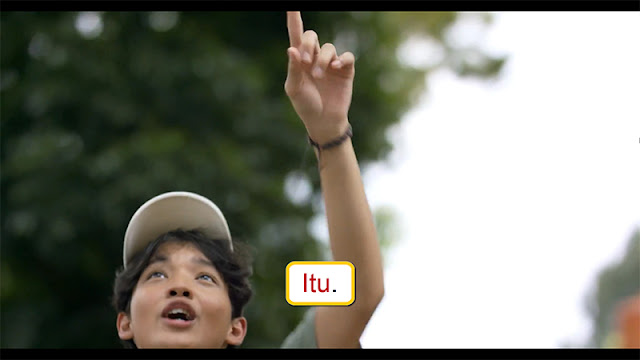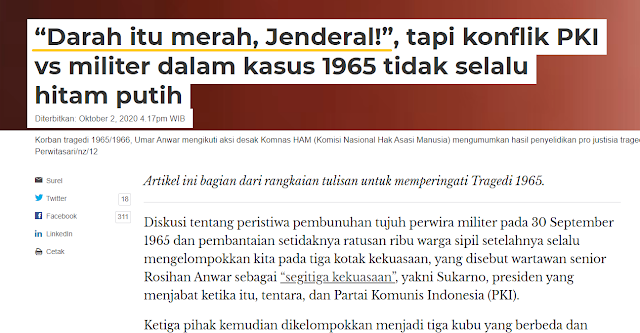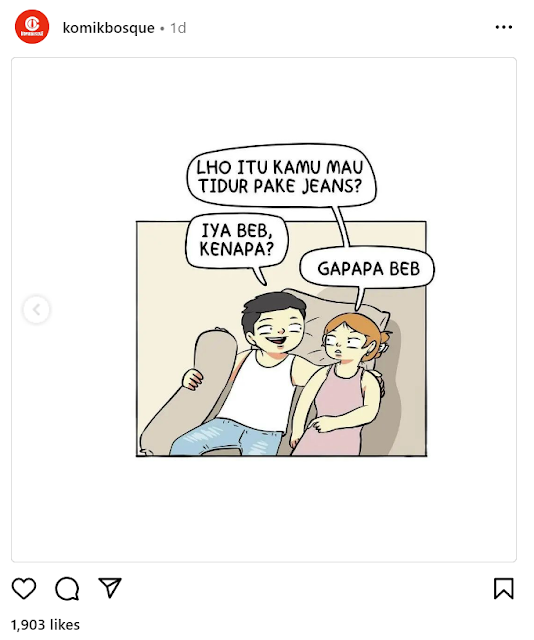- Get link
- X
- Other Apps
Posted by
Iman Prabawa
on
- Get link
- X
- Other Apps
Halo semuanya, ketemu lagi sama saya, Iman Prabawa. In this article, I want to talk about the meaning of [itu], [tu] and [tuh] in Indonesian. And as always, we are going to be watching examples from movie scenes and whatnot where the word is spoken by Indonesians.
If you have any questions regarding the Indonesian language, you can ask me directly. You can see how to do that on my About Me page.
If you are a beginner in the Indonesian language, you can learn step by step with My Lesson Here.
So now, let's dive in!
Itu, Tu, and Tuh In Bahasa Indonesia
[Itu] literally means [that]. [Tu] and [tuh] are informal for [itu]. The meanings of [itu], [tu], and [tuh] are the same.
Here are the meanings and usage of [itu], [tu], and [tuh] in Bahasa Indonesia.
1. To point to a thing or person that is far from the speaker.
Example sentence:
1. Rumah itu lokasinya berada di pinggir jalan raya. (The house is located on the side of the main road.)
2. A: Jadi, kamu mau beli yang mana? (So, which one are you going to buy?)
B: Yang itu. (That one.)
3. Tu dia! Ayo kita ke sana. (There he is! Let's go there.)
4. A: Loe liat tas gue ngga? (Have you seen my bag?)
B: Tuh! Di sana. (It's over there!)
5. A: Kata loe si A udah ngga jualan lagi. Itu ada tuh! (You said that he isn't selling anymore. There he is!)
B: Oh iya, ya. Kemarin-kemarin yang gue lihat udah ngga ada soalnya. Mungkin kemarin dia mudik doang kali ya? (Oh, my mistake! I said that because I'd never seen him for the last couple of days. Maybe on that couple of days, he went to his hometown.)
2. To refer back to a whole cause and to something that has already been spoken or written about.
Example sentence:
1. A: Kasih tahu si Lisa biar dia buruan dong. Kalau ngga kita telat nih. (Could you tell Lisa to hurry up. Or not we're gonna be late.)
B: Itu sih dari tadi juga udah gue bilangin ke dia. (I've already told her that.) <--- [Itu] here to refer to [kasih tahu si Lisa biar dia buruan].
2. A: Makanan itu ternyata enak banget lho! Gue tadi nyobain. (That food, I found it really delicious. I tried it just a moment ago.)
B: Makanan itu yang mana? (That food? What food?)
A: Makanan yang kita lihat pas kita pergi ke toko buku kemarin. (The food that we saw yesterday when we went to the bookstore.)
3. To emphasize something. It is usually used in conversational Indonesian, and actually, if you omit it, the meaning doesn't change.
Example sentence:
1. Itu tuh yang sering dia lakuin yang ngebuat orang-orang kesel sama dia. (That! That is the thing he often does that makes people hate him.) <-- [Itu] here to refer to a whole cause, and [tuh] is used just to emphasize the whole cause.
2. Ini tu makanan yang gue suka banget! (This! This is the food that I like so much!) <--- [Tu] here is just to emphasize. Actually, you can erase it, and the meaning does not change. Although the meaning does not change, the emotions are gone from that sentence.
4. To describe the subject or add more detail to the subject. In this case, it functions like a linking verb in the English language.
1. Darah itu merah, Jenderal! (Blood is red, General!)
2. Tempat ini tuh berantakan sekali deh! (This place looks like a mess!)
3. Dia tu ibumu! Kamu tidak boleh seperti itu terhadap ibumu sendiri. (She is your mother! You should not do such a thing to your own mother.) <-- Here, [tu] functions as a linking verb, and [itu] refers to the actions that are already done before.
How to Pronounce Itu, Tu, and Tuh
Here is how you pronounce [itu] in Bahasa Indonesia.
And here is how you pronounce [tu].
And this is how you pronounce [tuh].
Next, we will watch movie scenes where Indonesians speak the word.
Examples of Itu In Use
The first example we are about to watch is from Di Bulan Suci Ini..., Season 1, Episode 1 (2023). Let's watch the clip below.
Faisal: Stef! (Stef!)
Stefani: Apa? (What?)
Faisal: Burung. (A bird.)
Stefani: Mana? (Where?)
Faisal: Itu. (There.)
In this scene, Faisal points to a bird far away from him while riding his bicycle, and he uses [itu] while pointing to the bird.
The second example we are about to watch is from Najwa Shihab's YouTube Channel. Let's watch the clip below.
Below is the conversation from the clip with English translations
Najwa Shihab: Mas Anies, saya akan bertanya itu. Dan pertanyaannya sederhana saja. Soal kebebasan berpendapat, mas. (Anies, I will ask you about that. And the question is simple. It's about freedom of speech.)
Anies Baswedan: Apa tuh? (What's that?)
Najwa Shihab: Hmm, kalau diminta kasih skor, nilai 1 sampai 10, seberapa atmosfir kebebasan berpendapat di negeri ini menurut Anda? (Hmm, if you were asked to give a score from 1 to 10. What do you think about the atmosphere for freedom of speech in this country?)
From the clip above, we see there are [itu] and [tuh] being used by the speakers. [Itu] in [Mas Anies, saya akan bertanya itu] refers to the second usage of the word [itu] that I explained above, which is to refer to something that has already been spoken.
[Tuh] in [apa tuh?], you can change [tuh] into [itu], and it will become [apa itu?], and here is to refer to the question that Najwa is going to ask Mr. Anies.
Vocabulary From the Clip
[Mas] is an honorific title used to address a male person older than you are. For more about this, you can read my article here, Mas In Indonesian.
[Bertanya] = to ask.
[Pertanyaan] = question.
[Sederhana] = simple.
[Soal] = about.
[Kebebasan berpendapat] = freedom of speech.
[Diminta] = being asked.
[Kasih] can have many meanings depending on the context, but in this context, [kasih] means to give.
The third example is from a TV Program called Tonight Show Net. Let's watch the clip below.
For the conversation from the clip with English translations and vocabulary explanations, you can read my article titled Kulbet Meaning In Indonesian because this is from the same clip that is used there.
[Tu] in [kulbet tu apa sih?] is used to emphasize or refer to the third use that I have explained above. Here, actually, you can drop [tu], and it will become [kulbet apa sih?], but if you omit it, the emphasis is also gone.
[Itu] in [kulbet itu cool banget] is used to describe the subject or refer to the fourth use that I explained above.
The fourth example is a post from @komikbosque on Instagram, and you can follow them and read their comics here. Let's look at the picture below.
Cewe: Lho, itu kamu mau tidur pake jeans? (Whoa, you want to go to sleep with your jeans on?)
Cowo: Iya beb, kenapa? (Yeah, babe. Why?)
Cewe: Ga papa, beb. (Nope, nothing, babe.)
[Itu] here refers to the third use that I explained above, which is to emphasize, and actually, you can drop the word [itu] there, and the meaning is not changed.
Vocabulary From the Picture
[Cewe] = girls.
[Cowo] = boys.
[Lho] is used when you are surprised. For more about this, you can read my article here, Lho In Indonesian.
[Mau] = want.
[Pake] is informal for [pakai] = using.
[Ga papa] is informal for [tidak apa-apa] = it's okay.
The fifth example is still from @komikbosque's comics. Let's look at the picture below.
Cewe 1: Udah putusin aja. Rehan itu psyco. (Just dump him already. Rehan is psycho.)
Cewe 2: Psyco? (Psycho?)
[Itu] here refers to the fourth meaning that I explained above, which is to describe the subject. [Rehan is psyco] has the same meaning as [Rehan = psyco].
Vocabulary From the Picture
[Udah] is a common reduction for [sudah] = already.
[Putusin] is the conversational way of saying [putuskan] = to dump someone.
[Aja] is a common reduction for [saja] = just.
Read also: Santai Aja Kali In Indonesia
So, that wraps up today's article. If I find another example, Insha Allah, I will update this article again. Thank you for reading my article, and I'll see you soon. Bye now.
- Get link
- X
- Other Apps
Hello, I'm Iman Prabawa a.k.a Pak Guru Iman. I love to share about languages. My Instagram, @pakguruiman




Comments
Post a Comment